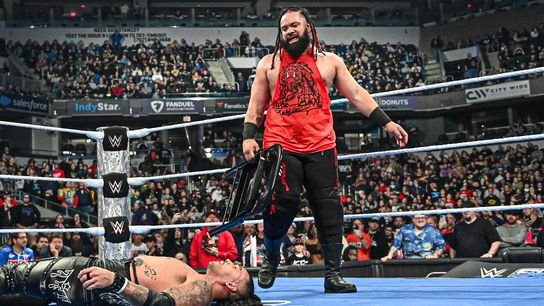A New Breed of Wrestling Superstar
In the modern era of professional wrestling, few names spark the same buzz and raw intensity as Jacob Fatu. Known as the “Samoan Werewolf,” Fatu has become one of the most exciting and unpredictable forces in the ring. Combining brute strength, wild charisma, and high-flying athleticism rarely seen in big men, Fatu represents a new breed of wrestler—one who blends the traditions of his Samoan heritage with a modern, hybrid style that’s captivating audiences around the world.
Born into one of wrestling’s most prestigious families, Jacob Fatu was destined for greatness. Yet, his journey to stardom wasn’t a straight path paved with opportunity. Instead, it was one filled with challenges, redemption, and transformation. Now, as he continues to dominate promotions like Major League Wrestling (MLW) and makes waves in larger circles, Fatu’s legacy is being carved not just from bloodlines, but from sheer impact and talent.
The Anoa’i Dynasty: Wrestling Royalty
To understand Jacob Fatu, one must first appreciate the lineage from which he hails. Fatu is a proud member of the legendary Anoa’i family, a Samoan dynasty that has contributed more to professional wrestling than almost any other.
The Bloodline That Changed Wrestling
From legends like Yokozuna, Rikishi, and Umaga, to current megastars such as Roman Reigns, The Usos, and Solo Sikoa, the Anoa’i family has consistently produced main-event talent across generations. Jacob Fatu is the son of The Tonga Kid (Sam Fatu) and the cousin of WWE Hall of Famer Rikishi, making him first cousins with Jimmy and Jey Uso. This deep-rooted connection has given Jacob Fatu both an immense legacy to uphold and a unique sense of pressure that few can understand.
Yet despite this wrestling pedigree, Fatu didn’t have the traditional grooming or early start his relatives enjoyed. Instead, he took a path through personal adversity, one that molded his toughness and shaped his persona as the “Samoan Werewolf.”
Trials, Redemption, and the Making of a Warrior
Before becoming a star inside the squared circle, Jacob Fatu’s life was marked by personal struggle. In his early years, he fell into trouble with the law and was even incarcerated. During this period, Fatu often spoke of hitting rock bottom and finding himself at a crossroads.
From the Streets to the Ring
Upon release, Fatu made a conscious decision to turn his life around. It was his uncle Rikishi who played a pivotal role in pulling him into the family business—training him in the ways of professional wrestling and instilling in him the discipline required to thrive. Under Rikishi’s guidance and the tutelage of the KnokX Pro Academy, Jacob Fatu began to channel his raw energy and aggression into wrestling. The ring became his sanctuary, a place to rewrite his story.
This journey of redemption—rising from a troubled past to emerge as a wrestling powerhouse—has added layers of depth to his character. It is not just his physicality or moveset that captivates fans; it’s the authenticity and fire in his story.
The Birth of the Samoan Werewolf
As Jacob Fatu began to compete across independent circuits, one thing became abundantly clear—he was unlike any other wrestler. Standing at around 6 feet 2 inches tall and weighing over 280 pounds, Fatu moves with the agility of a cruiserweight but strikes with the force of a heavyweight.
A Unique In-Ring Style
His in-ring style is a dynamic blend of Samoan savagery, hard-hitting power moves, and lucha-inspired aerial techniques. This rare fusion allows him to execute awe-inspiring moonsaults, superkicks, and dives over the ropes—moves that defy the expectations for someone his size. It’s no wonder fans and promoters alike began to take notice.
His moniker, “The Samoan Werewolf,” perfectly encapsulates his persona—unpredictable, wild, powerful, and relentless. Whether it’s a calm stare before a brutal onslaught or a feral scream after delivering a devastating Samoan Drop, Fatu owns his gimmick and brings a level of intensity that feels real.
Major League Wrestling: The Reign of Terror

Jacob Fatu’s major breakout moment came with Major League Wrestling (MLW), where he debuted in 2019 as a member of the villainous faction Contra Unit. It didn’t take long for him to ascend the ranks and claim the MLW World Heavyweight Championship, a title he held for an astounding 819 days.
MLW World Champion and Record Breaker
Fatu’s title reign was not only the longest in MLW history but also a demonstration of dominance rarely seen in modern wrestling. His feuds with top stars like Tom Lawlor, Alexander Hammerstone, and Davey Boy Smith Jr. showcased his versatility and ability to carry main-event programs. He defended the title across various venues, becoming the face of MLW and raising the promotion’s profile through his star power.
His run in MLW also showed his prowess on the mic and his ability to play both face and heel roles with ease. Whether portraying a merciless enforcer for Contra Unit or a misunderstood anti-hero, Fatu consistently connected with fans through raw intensity and authenticity.
Rumors, WWE Interest, and What’s Next?
As Fatu’s stardom grew, so too did speculation about a potential move to WWE or AEW. Given his family ties to The Bloodline storyline in WWE, many fans have clamored for his eventual inclusion in the dominant faction led by Roman Reigns.
The Bloodline Connection
Despite his absence from WWE, Jacob Fatu’s character would slot perfectly into The Bloodline’s narrative. His real-life ties and natural charisma could inject new life into the group or even set the stage for a civil war angle within the faction. Imagine Fatu confronting Reigns—not just as a cousin, but as a rival with his own claim to the throne.
As of 2025, Fatu has reportedly been scouted by major promotions, but he’s taken his time with any decision. His loyalty to MLW and desire to grow on his terms has been a defining trait, though the wrestling world waits eagerly to see where he lands next.
A Global Star in the Making
Beyond the United States, Jacob Fatu’s appeal is also growing internationally. He has competed in Mexico, the UK, and Canada, earning praise from fans and promoters alike. His matches are YouTube gold, drawing hundreds of thousands of views thanks to his highlight-reel moments and intense promos.
Fatu’s global popularity stems not just from his wrestling ability, but also from his underdog story—a man who defied expectations and overcame his past to rise through the ranks on his own terms. Wrestling fans everywhere respect a real one, and Jacob Fatu is as real as it gets.
Why Jacob Fatu Matters in Today’s Wrestling Landscape
In an era of scripted promos and overproduced segments, Jacob Fatu offers something different—a sense of danger and authenticity. His matches feel intense, his character believable, and his story inspiring. Fatu represents the bridge between tradition and evolution in wrestling.
Breaking Stereotypes and Setting New Standards
Jacob Fatu is redefining what it means to be a “big man” in professional wrestling. He’s not just a brute or a monster heel—he’s an athlete, a storyteller, and an entertainer. He’s capable of five-star performances, but also excels in gritty brawls. This versatility makes him a valuable asset to any promotion.
Furthermore, his journey from incarceration to championship gold sends a powerful message about redemption and second chances. It proves that wrestling is not just about winning belts—it’s about telling stories, connecting with fans, and inspiring others.
Conclusion
Jacob Fatu’s rise is still in progress, but the foundations of his legacy are already firmly set. He has brought honor to his family name, inspired fans with his personal turnaround, and proven that he is one of the most captivating performers in the business today.
Whether he remains in MLW or eventually joins the likes of WWE or AEW, one thing is certain: Jacob Fatu is a generational talent. With unmatched intensity, unmatched passion, and a growing global following, the Samoan Werewolf isn’t just dominating the wrestling world—he’s redefining it.
Read more Millicent Fawcett: The Fearless Pioneer Who Transformed Women’s Rights in Britain


